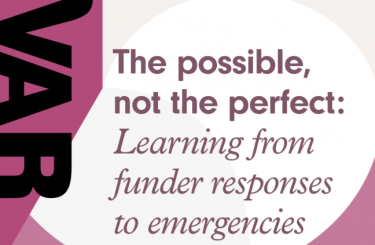Related


A guest blog by David Terrace (Grants Programme Manager - Older People and Housing, Mercers' Company)
Taking stock of the lessons learnt through a tumultuous 2020 whilst the pandemic rumbles on is not easy. In fact, it’s not the perfect time to do it at all. However, in the spirit of the oft-repeated mantra from London Funders, the possible not the perfect, here are my thoughts, taking stock before the end of the year.
Thinking back to March feels like rewinding twenty years, but it was only eight months ago that we began to use the phrase ‘unprecedented times’. The speed in which charities and communities self-organised in this manic period was incredible. I spoke to a number of the organisations funded through the Older People and Housing Programme here at the Mercers’ Company, and it was astounding and heart-warming how quickly charities were getting help to those who needed it.
There were foodbanks set up, distribution centres established and phone befriending services created overnight. This ran in parallel with the extraordinary mutual aid response across the country and meant that the most vulnerable (as defined by the government) were helped quickly whilst we waited for the state response to kick in.
The emergency nature of those first lockdown months and a clear common purpose ensured that action was taken quickly, with a focus on purpose rather than process.
As a funder, it was clear that we had to enable this quick, flexible response as part of the national response to covid-19. The Mercers’ Company quickly signed up to the London Funders pledge ensuring flexible and responsive behaviour. A rapid response fund was set up to help existing grantees (and it genuinely was rapid, turnaround time from application to money in account was around ten working days) as well as de-restricting grants for those who needed extra flexibility. Two of the team, including myself, volunteered to sift for the London Community Response. The emergency nature of those first lockdown months and a clear common purpose ensured that action was taken quickly, with a focus on purpose rather than process.
As the situation has evolved and the deepening economic and health effects have materialised, our funding response has attempted to keep pace. In June, we allocated a proportion of the yearly Older People & Housing Programme budget to align with the London Community Response. The purpose was to support organisations at a grass roots level who may not have heard of the Mercers’ or vice-versa.
Through the fund, eleven organisations working with communities across London were supported delivering activities from lunch clubs to intergenerational IT clubs. All of the organisations are doing incredible work engaging with older adults and none of whom had applied for funding previously.
The key questions, as with a lot of the response, will be how this continues (and indeed will it continue) in a post-covid world, whenever that might be.
The experience of the London Funders ‘aligned funding’, i.e. one common application entry form then funders identifying organisations which met their funding criteria and following usual process was positive. It retained an element of autonomy whilst streamlining the process for applicants. The key questions, as with a lot of the response, will be how this continues (and indeed will it continue) in a post-covid world, whenever that might be
The nine months of funding through the pandemic has accelerated the adoption of a number of funder practices that were considered ‘good’ before covid-19 and are now increasingly seen as standard. Trusting organisations who are delivering, and therefore experts in their fields, has been key. Regular conversations with grantees, asking what is needed and flexing processes has allowed people to get on with their jobs. This ultimately means better results for the grant money. The pandemic has also shown the value of collaborative working on both sides of the table.
The diversity and equity partners who have worked on the response have also shone a light on the difficulties that user led groups face in navigating the complex funding world.
Organisations in local areas have often put differences aside and worked together, bound by the common purpose. In my limited experience as a grant maker, I have personally never worked so closely with other funders and the benefits are obvious, as the sector moves from an attribution to contribution based approach. The diversity and equity partners who have worked on the response have also shone a light on the difficulties that user led groups face in navigating the complex funding world. It is vital that this work continues and we need to constantly refine our processes, informed by learning and evidence.
I have highlighted some positive examples of response and funder behaviours. However, there is still work to do in addressing power imbalances, equity of access to funding and joining up funder approaches. The pandemic response has shown that this is possible and now all the stops need to be pulled out not to creep back into old ways. In homage to the incredible London Funders team (who hugely deserve their Christmas break) the funder response has not been perfect, but we have seen what is possible and we need to strive for continuous improvement over the next year, whatever it may bring.

